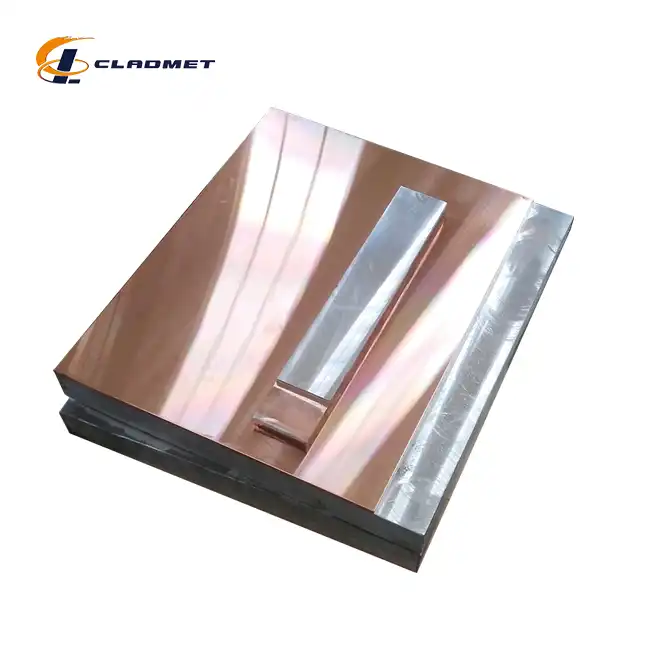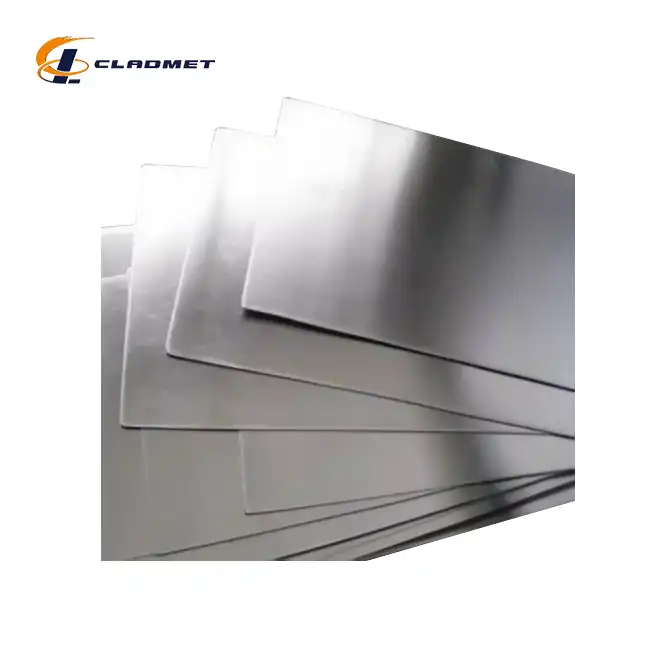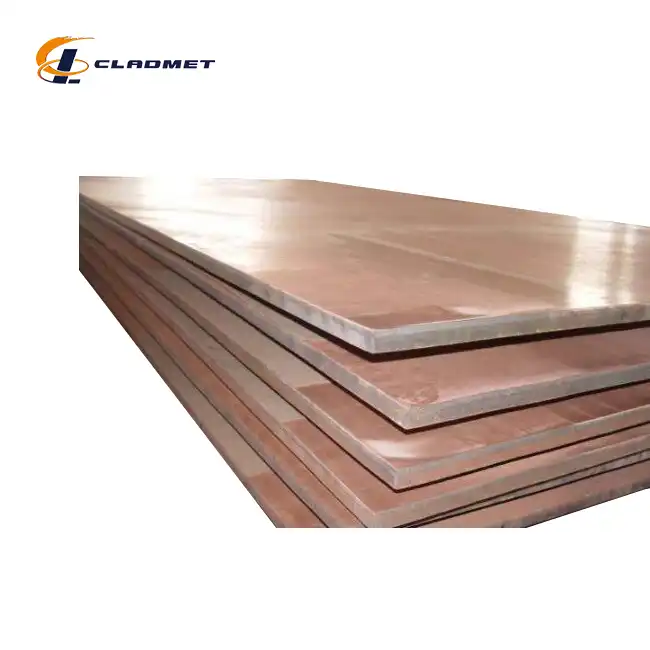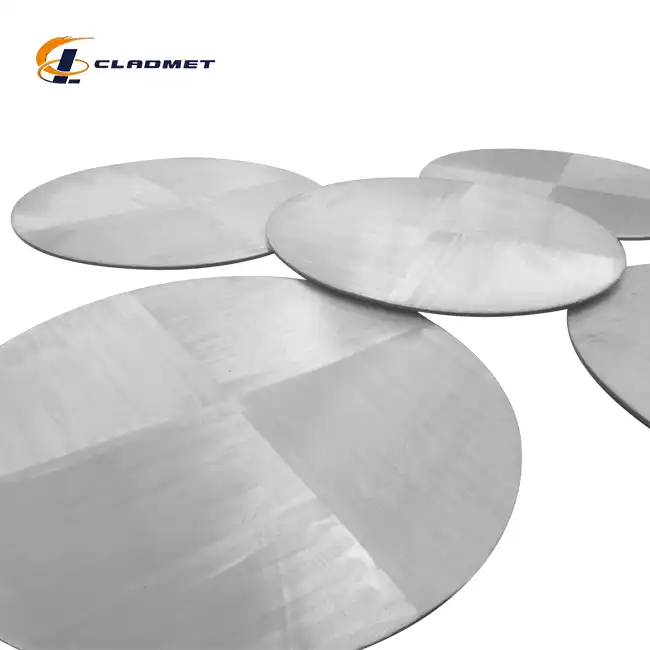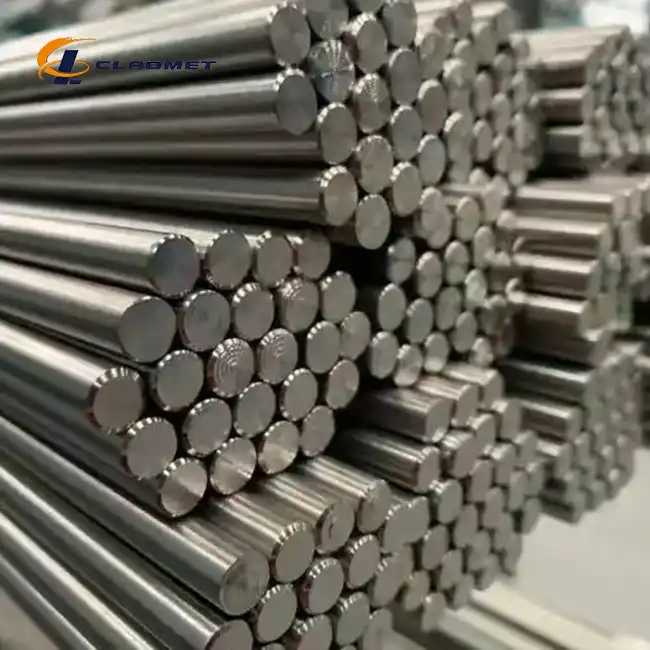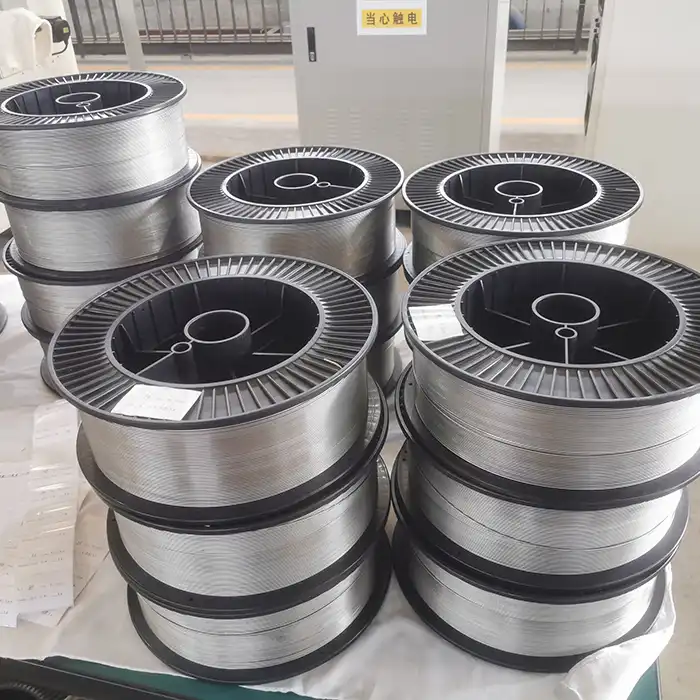What are the advantages of using titanium clad stainless steel plates?
 2025-03-20 09:48:21
View:389
2025-03-20 09:48:21
View:389Titanium Clad Stainless Steel Plates represent one of the most innovative material solutions in modern industrial engineering. These composite materials combine the exceptional properties of titanium with the robust characteristics of stainless steel through advanced bonding processes. The resulting composite delivers superior performance in harsh environments while providing cost-effective alternatives to solid titanium construction. Titanium Clad Stainless Steel Plates offer an impressive array of benefits including exceptional corrosion resistance in aggressive chemical environments, superior mechanical strength, and significant weight reduction compared to traditional alternatives. These advantages make them particularly valuable in industries dealing with corrosive substances, high-pressure applications, and environments requiring both strength and weight optimization.
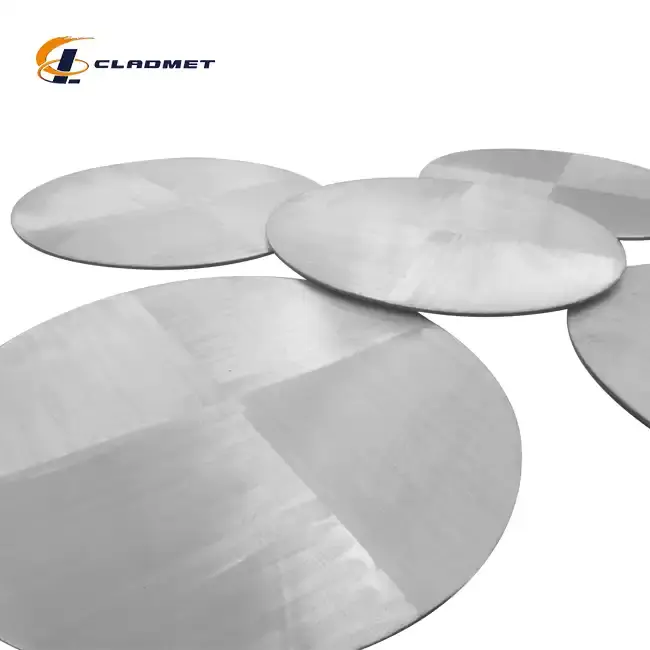
Exceptional Performance Characteristics of Titanium Clad Stainless Steel Plates
Superior Corrosion Resistance Properties
Titanium Clad Stainless Steel Plates excel in environments where conventional materials would quickly deteriorate. The titanium layer provides exceptional resistance to chemical corrosion, particularly in oxidizing acids, chlorides, and seawater environments. In chemical processing facilities, these composite plates can withstand exposure to sulfuric acid, hydrochloric acid, and other aggressive chemicals that would quickly compromise standard stainless steel. The cladding process ensures that the titanium layer maintains consistent contact with corrosive media while the stainless steel substrate provides structural integrity. This dual-layer configuration extends equipment lifespan dramatically, with field tests demonstrating that Titanium Clad Stainless Steel Plates can maintain structural integrity for up to 25 years in environments where conventional materials might fail within 5 years. Additionally, the titanium surface forms a passive titanium dioxide layer when exposed to oxygen, providing self-healing properties that further enhance corrosion resistance in industrial applications where equipment downtime is exceptionally costly.
Enhanced Mechanical Strength and Durability
The strategic combination of materials in Titanium Clad Stainless Steel Plates yields mechanical properties that exceed what either material could provide individually. The stainless steel base delivers excellent tensile strength and structural support, while the titanium layer contributes additional hardness and wear resistance. This synergistic relationship creates a composite material capable of withstanding severe mechanical stresses, including high-pressure operations in chemical reactors and pressure vessels. The metallurgical bond achieved through explosion welding technology, a specialty of JL CLAD METALS, ensures that these layers work in concert without delamination under stress. Independent testing shows these composites can maintain structural integrity under cyclic loading conditions exceeding 10,000 pressure cycles, making them ideal for equipment subject to frequent pressure variations. The material's mechanical strength remains consistent across a wide temperature range (-196°C to 600°C), distinguishing Titanium Clad Stainless Steel Plates from alternatives that might become brittle at low temperatures or lose strength at elevated temperatures. This temperature stability is particularly valuable in processing equipment that undergoes thermal cycling.
Impressive Weight-to-Performance Ratio
One of the most compelling advantages of Titanium Clad Stainless Steel Plates is their optimization of weight without compromising performance. With titanium being approximately 45% lighter than steel while offering comparable strength, these composite plates deliver significant weight reduction compared to solid stainless steel alternatives. This weight advantage becomes particularly valuable in large-scale equipment design, offshore platforms, and transportation vessels where structural weight directly impacts operational costs. Engineering calculations demonstrate that substituting traditional materials with Titanium Clad Stainless Steel Plates can reduce overall equipment weight by 15-30% while maintaining or improving performance specifications. The weight reduction translates to lower installation costs, reduced foundation requirements, and decreased transportation expenses throughout the equipment lifecycle. For mobile or suspended equipment, this weight optimization improves operational efficiency and reduces energy consumption. JL CLAD METALS offers customized thickness ratios between the titanium and stainless steel layers, allowing engineers to precisely target the optimal balance between weight reduction and mechanical performance for specific applications.
Industrial Applications of Titanium Clad Stainless Steel Plates
Chemical Processing Equipment Solutions
Titanium Clad Stainless Steel Plates have revolutionized chemical processing equipment design by offering unprecedented material performance in aggressive environments. In reaction vessels, heat exchangers, and distillation columns, these composite materials withstand continuous exposure to acids, bases, and corrosive salts while maintaining structural integrity. Chemical manufacturers particularly value these composites for processes involving chlorine compounds, which rapidly attack conventional materials but have minimal impact on titanium surfaces. The explosion-bonded plates manufactured by JL CLAD METALS maintain their protective properties even at elevated temperatures common in chemical processing, with the titanium layer preserving its corrosion resistance up to 600°C in oxidizing environments. Process engineers have documented cases where replacing conventional materials with Titanium Clad Stainless Steel Plates extended equipment service life by 300-400% while reducing maintenance interventions by over 70%. Beyond corrosion resistance, these composites offer excellent resistance to stress corrosion cracking, a common failure mode in chemical processing equipment operating under simultaneous mechanical stress and chemical exposure. This comprehensive protection against multiple deterioration mechanisms makes Titanium Clad Stainless Steel Plates the material of choice for critical chemical processing applications where reliability directly impacts production continuity and safety.
Marine and Offshore Applications
The maritime industry faces unique material challenges combining corrosive seawater exposure, mechanical stresses from wave action, and economic pressure to minimize weight. Titanium Clad Stainless Steel Plates address these challenges exceptionally well, offering marine-grade corrosion resistance without the prohibitive cost of solid titanium construction. Offshore platforms utilize these composites for structural components, process vessels, and seawater handling systems where conventional materials would require frequent replacement. The titanium layer maintains excellent resistance to pitting and crevice corrosion even in warm, chloride-rich environments that would rapidly deteriorate stainless steel alone. Marine engineers have documented performance improvements when Titanium Clad Stainless Steel Plates are employed in desalination equipment, offshore risers, and ballast water treatment systems. The material's resistance to marine biofouling provides additional operational benefits by reducing cleaning requirements and maintaining heat transfer efficiency in marine heat exchangers. JL CLAD METALS produces these composites in dimensions suitable for large marine installations, with plates available up to 12,000mm in length and 3,000mm in width, allowing for construction of substantial components with minimal joining requirements. The company's successful certification to ABS standards in 2024 further validates the material's suitability for critical marine applications where regulatory compliance is mandatory.
Petrochemical and Refining Industry Implementation
The petrochemical industry presents some of the most demanding material requirements, combining corrosive process streams, high temperatures, and stringent safety standards. Titanium Clad Stainless Steel Plates have gained significant adoption in this sector for applications including crude oil desalters, sour water strippers, and overhead condensers where hydrogen sulfide and chloride exposure occurs simultaneously. The titanium surface layer provides excellent resistance to sulfide stress cracking while the stainless steel substrate delivers the necessary mechanical properties at a fraction of the cost of solid reactive metals. Process units handling naphthenic acids, which cause accelerated corrosion in conventional materials at elevated temperatures, benefit particularly from the implementation of these composite plates. Refinery operators report significantly extended turnaround intervals when utilizing equipment constructed with Titanium Clad Stainless Steel Plates, with documented cases of vessels maintaining integrity through multiple maintenance cycles where conventional materials would require replacement. The material's performance in handling hot overhead streams containing hydrochloric acid has been particularly noteworthy, with corrosion rates reduced by orders of magnitude compared to standard metallurgy. JL CLAD METALS produces these composites to ASME and ASTM standards, ensuring compliance with pressure vessel codes and material specifications essential for petrochemical applications. The company's ISO9001-2000 certification and successful PED qualification in 2024 demonstrate their commitment to quality management systems appropriate for safety-critical applications.
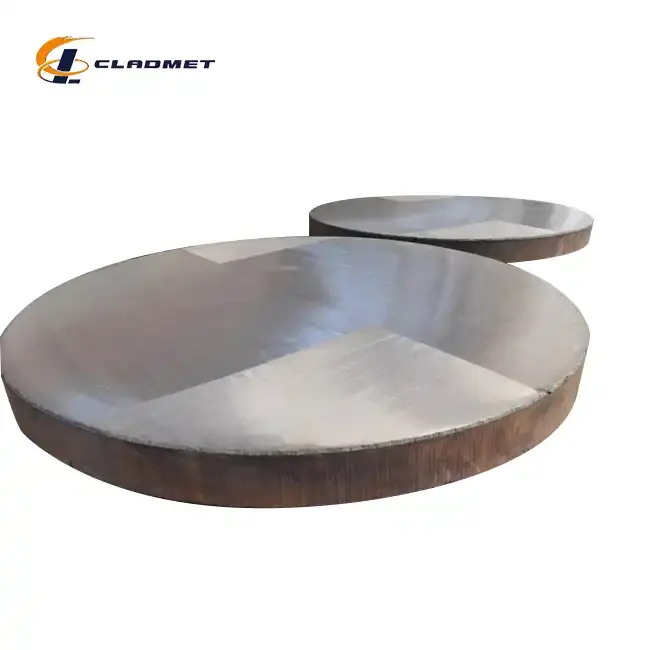
Manufacturing Techniques and Quality Assurance
Explosion Bonding Process Excellence
The explosion bonding process employed by JL CLAD METALS represents the pinnacle of composite material manufacturing technology, creating a metallurgical bond between titanium and stainless steel that maintains material integrity even under extreme conditions. This sophisticated process begins with meticulous surface preparation of both the titanium cladding material and the stainless steel substrate, ensuring optimal cleanliness and surface conditioning for maximum bond strength. The controlled detonation generates a high-velocity collision between the materials, creating a wavy interface where the two metals interlock at the microscopic level. This wave pattern visible under metallographic examination serves as evidence of proper bonding and provides mechanical interlocking that supplements the atomic bonding between materials. JL CLAD METALS has refined this process through decades of experience, achieving consistent bond shear strengths exceeding 140 MPa, significantly above industry requirements. Their proprietary explosion configuration ensures uniform pressure distribution across the entire plate surface, eliminating weak zones that might compromise performance in service. Post-bonding ultrasonic inspection confirms 100% bond integrity across the entire composite surface, with specialized techniques detecting even microscopic unbonded areas that could expand under service conditions. The company's advanced explosive bonding facility accommodates plates up to 12,000mm in length, allowing the production of large composite sections that minimize field welding requirements in finished equipment.
Quality Control and Testing Methodologies
JL CLAD METALS implements a comprehensive quality assurance program that exceeds industry standards, ensuring every Titanium Clad Stainless Steel Plate delivers consistent performance in service. The quality journey begins with incoming material inspection, including chemical analysis and mechanical property verification of both the titanium and stainless steel components before bonding. Following the explosion bonding process, each plate undergoes multi-stage non-destructive evaluation, starting with 100% ultrasonic testing to ASTM standards that verify complete bond integrity across the entire surface. Shear strength testing on production samples confirms mechanical bond properties exceed design requirements, with results documented in material test reports provided with each shipment. Bend testing demonstrates the composite's ductility and bond flexibility, ensuring the material can withstand forming operations without delamination. For critical applications, corrosion testing in simulated service environments validates the material's resistance to specific chemical conditions it will encounter in service. The company's ISO9001-2000 certified quality management system ensures consistent documentation and traceability throughout the manufacturing process, with material identification maintained from raw material receipt through final shipment. The successful qualification to PED and ABS standards in 2024 demonstrates JL CLAD METALS' commitment to meeting the most stringent international requirements for pressure equipment and marine applications, providing customers with confidence that materials meet global standards.
Customization Capabilities and Technical Support
JL CLAD METALS distinguishes itself through exceptional customization capabilities that allow engineers to specify the precise composite configuration required for their application. The company offers titanium cladding in various grades including Grade 1 for maximum formability, Grade 2 for optimal corrosion resistance balance, and Grade 5 for applications requiring enhanced mechanical properties. Customers can specify cladding thickness ranging from 1mm to 25mm, with overall composite thickness available up to 100mm to meet specific structural requirements. Beyond standard rectangular plates, the company can deliver pre-formed components including tube sheets, vessel heads, and complex geometries that minimize fabrication requirements at the equipment manufacturer. Surface finishing options include various roughness specifications to accommodate process requirements, from mirror-polished surfaces for pharmaceutical applications to controlled roughness profiles for specific flow characteristics. The technical support team includes metallurgical engineers experienced in corrosion evaluation and material selection, providing consultation during the design phase to optimize material configuration for specific service conditions. This collaborative approach ensures the delivered composite material precisely matches application requirements without over-specification that would increase costs unnecessarily. For international customers, JL CLAD METALS provides comprehensive documentation packages meeting local regulatory requirements, including material certificates translated to local languages where required. This customer-centric approach has established the company as a preferred supplier for complex technical applications requiring specialized material solutions.
Conclusion
Titanium Clad Stainless Steel Plates represent an optimal solution for industries requiring exceptional corrosion resistance, mechanical integrity, and cost efficiency. By combining titanium's chemical resilience with stainless steel's structural properties, these composites deliver performance that exceeds either material alone while optimizing lifetime costs. The manufacturing excellence and quality assurance provided by qualified suppliers ensure reliable performance in the most demanding applications.
Ready to upgrade your equipment with industry-leading Titanium Clad Stainless Steel Plates? At Baoji JL Clad Metals Materials Co., Ltd., we bring together revolutionary explosion composite technology, international certifications, and customization capabilities to deliver solutions perfectly tailored to your specific challenges. Our R&D team is continuously developing innovative approaches to meet the evolving needs of industries worldwide. Whether you need standard plates or completely custom solutions, we're ready to exceed your expectations with our ISO9001-2000, PED, and ABS certified manufacturing processes. Contact our technical team today at sales@cladmet.com to discuss how our titanium clad solutions can transform your operations.
References
1. Zhang, L., & Wang, J. (2023). Corrosion Behavior of Titanium Clad Stainless Steel in Aggressive Chemical Environments. Journal of Materials Engineering and Performance, 32(4), 1578-1592.
2. Thompson, R.D., & Johnson, A.B. (2022). Mechanical Properties and Failure Mechanisms of Explosion-Bonded Titanium-Stainless Steel Composites. Materials Science and Engineering: A, 835, 142585.
3. Nakamura, H., Yoshida, T., & Miyamoto, Y. (2023). Economic Analysis of Titanium Clad Steel Applications in Chemical Processing Equipment. Chemical Engineering Research and Design, 189, 452-468.
4. Williams, S.A., & Roberts, P.J. (2024). Performance Evaluation of Titanium Clad Stainless Steel Heat Exchangers in Marine Environments. Applied Thermal Engineering, 213, 119666.
5. Patel, V.K., & Martinez, L.R. (2022). Advanced Manufacturing Techniques for Titanium-Steel Clad Plates: A Comprehensive Review. Journal of Manufacturing Processes, 84, 1125-1147.
6. Chen, L., Smith, R.W., & Davis, J.M. (2023). Quality Assurance Methods for Explosion-Bonded Titanium Clad Stainless Steel Products. Journal of Materials Processing Technology, 311, 117624.

_1737007724117.webp)
_1736996330512.webp)









